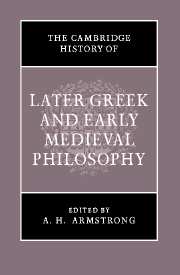Book contents
- Frontmatter
- Chapter 1 Introductory
- Part 1 GREEK PHILOSOPHY FROM PLATO TO PLOTINUS
- Part II PHILO AND THE BEGINNINGS OF CHRISTIAN THOUGHT
- Part III PLOTINUS
- Part IV THE LATER NEOPLATONISTS
- Chapter 17 Introduction to later Neoplatonism
- Chapter 18 Porphyry and Iamblichus
- Chapter 19 Athenian and Alexandrian Neoplatonism
- Part V MARIUS VICTORINUS AND AUGUSTINE
- Part VI THE GREEK CHRISTIAN PLATONIST TRADITION FROM THE CAPPADOCIANS TO MAXIMUS AND ERIUGENA
- Part VII WESTERN CHRISTIAN THOUGHT FROM BOETHIUS TO ANSELM
- Part VIII EARLY ISLAMIC PHILOSOPHY
- Select Bibliography
- Additional Notes and Bibliography
- Index of ancient and medieval works referred to in the text
- General Index
- Index of Greek terms
- References
Chapter 18 - Porphyry and Iamblichus
from Part IV - THE LATER NEOPLATONISTS
Published online by Cambridge University Press: 28 March 2008
- Frontmatter
- Chapter 1 Introductory
- Part 1 GREEK PHILOSOPHY FROM PLATO TO PLOTINUS
- Part II PHILO AND THE BEGINNINGS OF CHRISTIAN THOUGHT
- Part III PLOTINUS
- Part IV THE LATER NEOPLATONISTS
- Chapter 17 Introduction to later Neoplatonism
- Chapter 18 Porphyry and Iamblichus
- Chapter 19 Athenian and Alexandrian Neoplatonism
- Part V MARIUS VICTORINUS AND AUGUSTINE
- Part VI THE GREEK CHRISTIAN PLATONIST TRADITION FROM THE CAPPADOCIANS TO MAXIMUS AND ERIUGENA
- Part VII WESTERN CHRISTIAN THOUGHT FROM BOETHIUS TO ANSELM
- Part VIII EARLY ISLAMIC PHILOSOPHY
- Select Bibliography
- Additional Notes and Bibliography
- Index of ancient and medieval works referred to in the text
- General Index
- Index of Greek terms
- References
Summary
Porphyry's philosophical career
Most of the features of Neoplatonism that we have been sketching are evident in the work of Porphyry. So it will avoid repetition to give him more attention than might otherwise have seemed due to him. Porphyry was born in about 232, the year when Plotinus started to study philosophy at Alexandria. His parents were well-to-do Syrians, and he spent most of his boyhood, so far as we know, in the busy Phoenician city of Tyre. Even if he did not travel he had ample opportunity there to make the far from superficial acquaintance with the mystery cults and magical practices of the Middle East and beyond which his writings were to show. He probably knew several languages by the time he came to the West; he continued to read widely; and it was not a conventional compliment that Simplicius paid when he called him the most learned of philosophers. Three later stages of his career have left their mark on his philosophy, his attendance at Longinus' lectures, his friendship with Plotinus and a period away from Plotinus in Sicily.
Like other young foreigners of means but a little older than most, it would seem, Porphyry continued his education at Athens. Here the dominant influence was that of Longinus (who died in 272). The old-fashioned taste of the famous critic no doubt had some part in the clarity of Porphyry's style which was soon contrasted with Plotinus' indirectness. But this ‘living library and walking museum’, as Eunapius called him, lectured on philosophy too; and we have the testimony of both to their friendship.
- Type
- Chapter
- Information
- Publisher: Cambridge University PressPrint publication year: 1967

